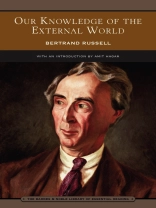Bertrand Russell’s Our Knowledge of the External World investigates the problem of perception from an analytic-philosophical perspective. Here the great British mathematician and philosopher gives a thoughtful exposition of his logically motivated epistemology and argues for a controversial solution to a long-standing philosophical riddle. Skilfully written with an accessible lucidity by a brilliant scholar, it requires of the reader neither prior knowledge of logic nor aptitude for philosophical inquiry. The book serves as essential reading for anyone interested in the intersection of logic and epistemology including the development of analytic philosophy in the twentieth century.
เกี่ยวกับผู้แต่ง
Bertrand Russell (1872–1970)—one of the greatest philosophers of the twentieth century—made noteworthy contributions not just to logic and philosophy, but also to a broad range of other subjects including education, history, political theory and religious studies. Having been educated privately, he entered Cambridge Trinity College in 1890, where he met Alfred North Whitehead and with him started the ambitious project of reducing mathematics to logic. His early philosophical work (along with that of his pupil Ludwig Wittgenstein) had been mainly analytic and as such was one of the inspirations for the analytic movement in philosophy.












